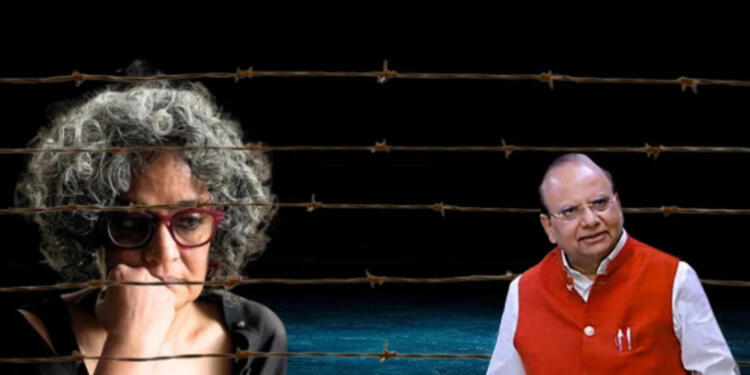The Lieutenant Governor of Delhi has granted permission to proceed with a case under the UAPA against controversial writer Arundhati Roy. This case is based on Arundhati Roy’s speech given on October 21, 2010, at the ‘Azadi: The Only Way’ seminar in Delhi. The seminar also included India-opposer Syed Ali Shah Geelani, Sheikh Showkat Hussain, Varavar Rao, among others. The CRPP organized the seminar, and Arundhati criticized India during her 15-minute speech.
What Arundhati Roy said in her statement
In her speech, Arundhati claimed that the Indian government is waging war against the poor. She said, ‘I was in Ranchi a week or ten days ago where the People’s Tribunal against Operation Green Hunt was underway. Operation Green Hunt is a war by the Indian state against the poorest people in the country.’ When journalists asked about her stance on Jammu and Kashmir, Arundhati said, ‘Kashmir has never been an integral part of India.’ This is the same line repeated by Pakistan.
Allegations of occupying parts of India
Arundhati also accused the Indian government of occupying parts of India through military intervention. She stated that the Indian government has intervened in Manipur, Nagaland, Mizoram, Kashmir, Telangana, Naxal areas, Punjab, Hyderabad, Goa, and Junagadh. She accused the Indian government of waging war against the wealthy class with the Naxalites.
Allegations of waging war against minorities
Arundhati said that high-caste Hindu states like India have always waged war against minorities including Muslims, tribals, Christians, Dalits, and forest dwellers. This is the modern history of our country. After provoking internal people in India, Arundhati openly advocated for Kashmir’s separation from India. She furthered the Pakistani narrative of ‘Azadi’ and said that India has occupied Kashmir and its people.
Provocative statements regarding Kashmir
Recalling a conversation in 2007, Arundhati said, ‘India needs freedom from Kashmir as much as Kashmir needs freedom from India.’ She also said that the valley of 12 million people has 700,000 security personnel, making it the most militarized zone in the world.
Arundhati stated that accepting this occupation by Indian people is like permitting moral damage. In her provocative speech, Arundhati said, ‘Kashmiris cannot breathe in the smoke that comes out of the barrel of an AK-47. Much has been done here. Every time there is an election, people vote, and the Indian government goes there and says, ‘Why do you need a referendum? People vote here for India.’
Arundhati compared the struggle for ‘Azadi’ in Kashmir to the fight Britain faced against India. She said, ‘Whether it was British rule in India, or Indian rule in Kashmir, Nagaland or Chhattisgarh, its elite manage this occupation. You must know how to deal with your enemies and respond to them, whether it’s at the international level of politics or at a local level, you must make your allies.’
Case filed in 2010
Immediately after Arundhati Roy’s controversial speech in October 2010, social activist Sushil Pandit filed a case against her. The police registered an FIR on November 29, 2010.
Charges under IPC
Arundhati Roy faced charges under sections 124A (sedition), 153A (promoting enmity between different groups on grounds of religion, race, place of birth, residence, language), 153B (imputations, assertions prejudicial to national integration), 504 (intentional insult with intent to provoke breach of the peace), and 505 (statements conducing to public mischief) of the Indian Penal Code.
Case to be pursued under UAPA
Nearly 14 years later, on June 14, 2024, the Lieutenant Governor of Delhi granted permission to pursue a case against Arundhati Roy under Section 13 of the Unlawful Activities (Prevention) Act, 1967.
Conclusion
In conclusion, Arundhati Roy’s provocative statements and actions have consistently undermined national unity and integrity. Her advocacy for separatist movements like in Kashmir and her disparaging remarks against the Indian state reflect a disregard for the nation’s sovereignty and the sacrifices made by its people. Such rhetoric not only fuels division but also disrespects the democratic processes and legal frameworks of the country. The decision to proceed with legal action under UAPA emphasizes how seriously her actions are being viewed. The statement serves as a reminder that people must exercise freedom of speech responsibly, avoiding inciting disharmony or endangering national security.
ALSO READ: The increasing number of Rohingya Infiltrators in India: Causes and Consequences
























